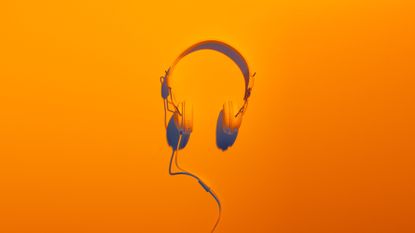
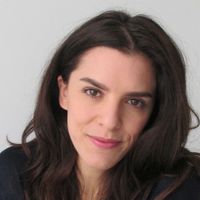
Thinking of starting a podcast? Well, there's a reason #DropsMic is a thing and #PicksUpMic isn't: Creating a podcast isn't as easy as it sounds. Here are some of the things my co-host Jessica Matlin (the deputy beauty editor of Cosmopolitan) and I learned while launching Fat Mascara, a weekly beauty podcast.
1. Come up with a format.
Do you want to do a narrative podcast, where you tell a story that's pre-written and pre-reported, à la This American Life and Serial? Is it an interview show? Is it a talking-head-type thing? Our podcast was Jess's idea, and when she first pitched it to an acquaintance at a production company, she had a format in mind: short news segments, deeper discussions on how beauty relates to society and culture, and interviews with people in the industry. The producer at this particular company was responsive, but also pointed out the second lesson of podcasting…
2. Don't go it alone unless you're a comedian.
Or maybe a pundit or somebody who's already famous. But, really, if you're not doing narrative storytelling and you're not Joe Rogan, Marc Maron, or Anna Faris, you probably need a co-host. Because no matter how smart and cool and outgoing you are (and trust me, Jess is), without a co-host to play off of and create energy, you can end up sounding canned. (BTW, that's when I came onboard! Thanks Jess!)
A post shared by Jennifer G. Sullivan (@jenn_edit)
A photo posted by on
3. Decide whether or not to self-publish.
It's not technically difficult to record and mix audio then publish it on podcast platforms like iTunes, SoundCloud, and Stitcher. At the bare minimum you need a computer, a desktop USB microphone, and recording software like GarageBand (there are even free versions). But if that's your set-up, it's going to sound pretty janky. Jess and I didn't want to shell out money for good equipment—nor did we have the time or inclination to mix sound files—so we decided to try and find a production company willing to take us on. Which brings us to lesson #4…
4. Lawyers are your friends.
We finessed our format and pitched it to Embassy Row, a TV production company that also has a digital development team. Honestly, I think they were less interested in the format and topics and more interested in seeing how Jess and I interacted and if we had chemistry. Whatever they saw, they were into it and offered us what was more or less a development deal: They would help us create, brand, and produce the show for a set term to see if it would take off and bring in sponsorships. That's when we got a lawyer to hash out the details. Side note: Even if you end up self-publishing, it's a good idea to get a lawyer to consult with about trademarks, licensing, and copyright issues, which become especially important if you plan on reading books or articles aloud or using music.
A post shared by Fat Mascara (@fatmascara)
A photo posted by on
5. Practice makes worse—sorta.
While they lawyers were lawyering, Jess and I recorded sample shows to work on our rhythm, figure out what kind of segments would be entertaining, and learn not to talk over each other. (We also did some sample interviews with guests, but I'll save the interviewing tips for another time.) The biggest thing we learned was that you can't practice what you're going to talk about beforehand, because if you do, the recorded segments feel stilted and flat. In fact, we don't actually know what either of us is going to say in a segment until we start recording, and we think hope that it makes the show more fun to listen to.
At this point, we're only a few episodes in and we make mistakes all the time. But we're learning every week. And as we progress and start to incorporate more listener feedback, we're hoping our subscribers will come along for the ride. On that note, we are totally down for constructive (or non-constructive) criticism, so please listen to Fat Mascara, and then tweet or email to let us know what sucks and what doesn't.
Stay In The Know
Marie Claire email subscribers get intel on fashion and beauty trends, hot-off-the-press celebrity news, and more. Sign up here.
Follow Marie Claire on Instagram for the latest celeb news, pretty pics, funny stuff, and an insider POV.
Jennifer Goldstein is the former beauty & health director of Marie Claire and co-host of the award-winning beauty podcast Fat Mascara. In her quest to uncover the world's beauty secrets, she’s gotten tattooed in New Zealand, dug up turmeric in India, harvested shea nuts in Ghana, and squeezed enzyme-rich eggs from salmon in Norway. She can pluck eyebrows like a pro and has read the FDA monograph on sunscreen labeling and effectiveness—but she still can’t get liquid eyeliner to look the same on both eyes.
-
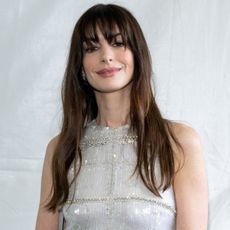 Anne Hathaway Details the "Gross" Audition Request She Once Endured
Anne Hathaway Details the "Gross" Audition Request She Once Endured"Now we know better."
By Meghan De Maria Published
-
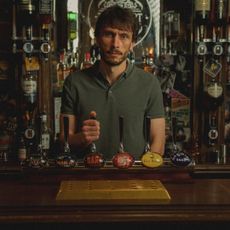 The Emotional Ending of 'Baby Reindeer,' Explained
The Emotional Ending of 'Baby Reindeer,' ExplainedNetflix's latest miniseries from Richard Gadd is based on the true story of the comedian and his stalker.
By Quinci LeGardye Published
-
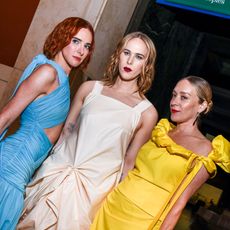 The Must-Visit Hair Colorists in New York City
The Must-Visit Hair Colorists in New York CityI trust these talented colorists implicitly.
By Sophia Vilensky Published
-
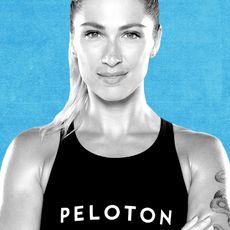 Peloton’s Selena Samuela on Turning Tragedy Into Strength
Peloton’s Selena Samuela on Turning Tragedy Into StrengthBefore becoming a powerhouse cycling instructor, Selena Samuela was an immigrant trying to adjust to new environments and new versions of herself.
By Emily Tisch Sussman Published
-
 This Mutual Fund Firm Is Helping to Create a More Sustainable Future
This Mutual Fund Firm Is Helping to Create a More Sustainable FutureAmy Domini and her firm, Domini Impact Investments LLC, are inspiring a greater and greener world—one investor at a time.
By Sponsored Published
-
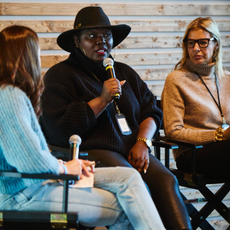 Power Players Build on Success
Power Players Build on Success"The New Normal" left some brands stronger than ever. We asked then what lies ahead.
By Maria Ricapito Published
-
 Don't Stress! You Can Get in Good Shape Money-wise
Don't Stress! You Can Get in Good Shape Money-wiseYes, maybe you eat paleo and have mastered crow pose, but do you practice financial wellness?
By Sallie Krawcheck Published
-
 The Book Club Revolution
The Book Club RevolutionLots of women are voracious readers. Other women are capitalizing on that.
By Lily Herman Published
-
 The Future of Women and Work
The Future of Women and WorkThe pandemic has completely upended how we do our jobs. This is Marie Claire's guide to navigating your career in a COVID-19 world.
By Megan DiTrolio Published
-
 Black-Owned Coworking Spaces Are Providing a Safe Haven for POC
Black-Owned Coworking Spaces Are Providing a Safe Haven for POCFor people of color, many of whom prefer to WFH, inclusive coworking spaces don't just offer a place to work—they cultivate community.
By Megan DiTrolio Published
-
 Where Did All My Work Friends Go?
Where Did All My Work Friends Go?The pandemic has forced our work friendships to evolve. Will they ever be the same?
By Rachel Epstein Published